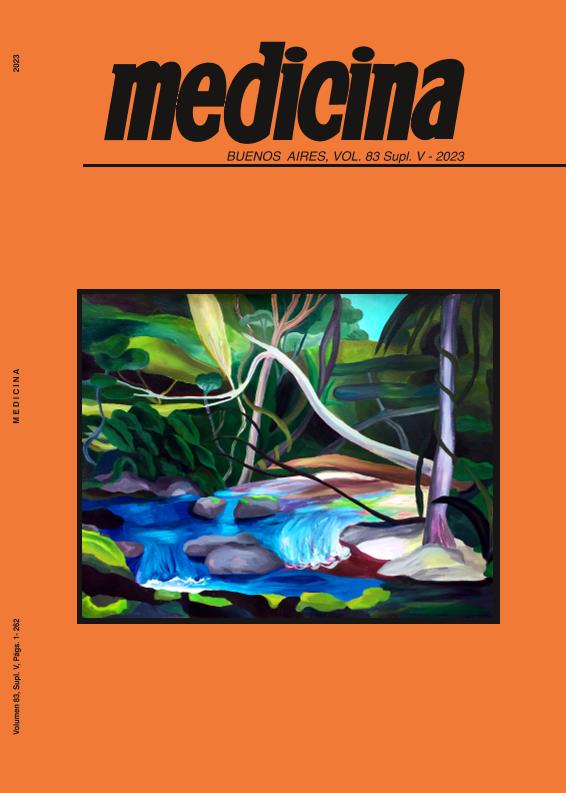Evento
Antimicrobial activity of the novel bacteriocin AP7121: from in vitro assays to an in vivo preliminary intranasal treatment approach
Schofs, Laureano ; Sparo, Mónica Delfina; Lissarrague, Sabina; Bistoletti, Mariana
; Sparo, Mónica Delfina; Lissarrague, Sabina; Bistoletti, Mariana ; de Yaniz, María Guadalupe
; de Yaniz, María Guadalupe ; Sanchez Bruni, Sergio Fabian
; Sanchez Bruni, Sergio Fabian
 ; Sparo, Mónica Delfina; Lissarrague, Sabina; Bistoletti, Mariana
; Sparo, Mónica Delfina; Lissarrague, Sabina; Bistoletti, Mariana ; de Yaniz, María Guadalupe
; de Yaniz, María Guadalupe ; Sanchez Bruni, Sergio Fabian
; Sanchez Bruni, Sergio Fabian
Tipo del evento:
Reunión
Nombre del evento:
LXVIII Reunión Anual de la Sociedad Argentina de Investigación Clínica; XXV Jornadas Anuales de la Sociedad Argentina de Biología; LV Reunión Anual de la Asociación Argentina de Farmacología Experimental y VIII Reunión Científica Regional de la Asociación Argentina de Ciencia y Tecnología de Animales de Laboratorio
Fecha del evento:
15/11/2023
Institución Organizadora:
Sociedad Argentina de Investigación Clínica;
Sociedad Argentina de Biología;
Asociación Argentina de Farmacología Experimental;
Asociación Argentina de Ciencia y Tecnología de Animales de Laboratorio;
Título de la revista:
Medicina (Buenos Aires)
Editorial:
Fundación Revista Medicina
ISSN:
1669-9106
Idioma:
Español
Clasificación temática:
Resumen
The impact of staphylococci infections on human and animal health increased as result of its ability to become resistant to antimicrobials. Most Staphylococcus spp. (Staph) infections are endogenously acquired, and treatment of nasal carriage is one strategy for prevention. AP7121 bacteriocin, showed in vitro bactericidal activity against Staph. The main goals of this study were: a) to assess the nasal carriage of Staphylococcus species in asymptomatic dogs, and b) to test the effect of intranasal administration of AP7121 in the staphylococci population. Dogs were randomly allocated in two groups (n=3) and two intranasal administration protocols were evaluated as follows: protocol A: canines received one dose of either 150 µL of sterile saline solution (SSS) (control group) or 150 µL of AP7121 solution (330 µg/mL) (AP7121 group); protocol B: dogs received 100 µL every 24 h for 3 days of SSS or AP7121 (330 µg/mL). Previous to each treatment (T0) and 24 h after the topical treatment (T1), standardized nasal swabs samples of both nasal vestibules were taken. Swabs were systematically inoculated and cultured in Mannitol salt agar and Blood agar. Staph isolates were phenotypically characterized according to antimicrobial sensibility using the disk diffusion method and VITEK® 2 system. Fischer exact Test was used for statistical analysis of treatments. Variability in Staphylococcus species was found in many cases among individual dogs in T0 and T1. Fifty Staph strains were isolated, being 58% (29/50) resistant to Penicillin and 4% (2/50) showing inducible macrolide and lincosamide resistance. Protocol A treatment failed to reduce the viability of the nasal staphylococci population. However, protocol B (3 doses of AP7121) showed a significant 50% of decolonization (p<0.01). In conclusion, the antimicrobial effect of AP7121 against Staph could be explored as a potential alternative for nasal decolonization therapy in dogs, as in previous clinical humans´ studies.
Palabras clave:
Bacteriocinas
,
AP7121
,
Staphylococcus spp.
,
Resistencia antimicrobiana
Archivos asociados
Licencia
Identificadores
Colecciones
Eventos(CIVETAN)
Eventos de CENTRO DE INVESTIGACION VETERINARIA DE TANDIL
Eventos de CENTRO DE INVESTIGACION VETERINARIA DE TANDIL
Citación
Antimicrobial activity of the novel bacteriocin AP7121: from in vitro assays to an in vivo preliminary intranasal treatment approach; LXVIII Reunión Anual de la Sociedad Argentina de Investigación Clínica; XXV Jornadas Anuales de la Sociedad Argentina de Biología; LV Reunión Anual de la Asociación Argentina de Farmacología Experimental y VIII Reunión Científica Regional de la Asociación Argentina de Ciencia y Tecnología de Animales de Laboratorio; Mar del Plata; Argentina; 2023; 60-61
Compartir



